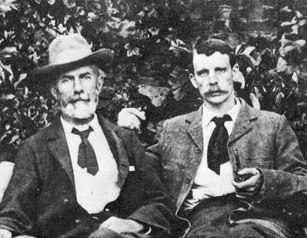|
 Edward
Carpenter (1844 – 1929), though from an upper class naval family, ran
away from privilege to throw in his lot with working people. Living
for most of his life in and around Sheffield, in his day he was very
famous as a freethinking author and campaigner, and as the writer of
the socialist song England Arise. Edward
Carpenter (1844 – 1929), though from an upper class naval family, ran
away from privilege to throw in his lot with working people. Living
for most of his life in and around Sheffield, in his day he was very
famous as a freethinking author and campaigner, and as the writer of
the socialist song England Arise.
He was born
in Brighton in 1844, went to Brighton College and Cambridge where he
became a fellow and a curate in the C of E and very nearly a tutor for
the Royal family. After rejecting this he came North, at first
teaching in the university extension movement (the WEA of its day) in
Leeds and Sheffield, then market gardened and agitated from an
isolated home at Millthorpe on the Derbyshire edge of Sheffield where
he made sandals, wrote poetry and politics, and lived for decades
according to his ideas of a simpler, more communal life.
Mainly
remembered now as the granddaddy of gay rights campaigning - living
openly with his lover and writing bravely about it - he was also an
advocate of socialism, anarchism, feminism, vegetarianism, clothes
reform and teetotalism. He opposed imperialism, vivisection, war and
capital punishment. He travelled widely, writing sympathetically about
India and Ceylon. He believed in nude sunbathing, trade unions and the
value of having your piano in the kitchen. And of course sandals,
which he designed, made and popularised.
He was the
friend – and possibly lover - of the famous American poet Walt
Whitman, and imitated him in his own long poetry cycle Towards
Democracy, the touchstone for many an early socialist. He
made sandals for Bernard Shaw, who satirised him in Candida, and
helped EM Forster both to come out and write. He lead meetings with
William Morris, supported Bert Ward and the Sheffield Clarion
ramblers, the suffragettes, and the campaign for clean air.
 The
signatories to his 70th and 80th birthday cards
include almost every important labour and trade union figure of his
time. Gay campaigners the world over pay him dues as a courageous man
in advance of public opinion - who, at the time of the Oscar Wilde
trial, theorised and celebrated gay sexuality. The
signatories to his 70th and 80th birthday cards
include almost every important labour and trade union figure of his
time. Gay campaigners the world over pay him dues as a courageous man
in advance of public opinion - who, at the time of the Oscar Wilde
trial, theorised and celebrated gay sexuality.
Sheffield
never gave him any civic recognition but there is an extraordinary
collection of his lives in the Sheffield Archives. There are hundreds
of letters to and from all the important thinkers, reformers and
artists of his time. There are sermons, notebooks, lectures, books,
pamphlets, memoirs, photographs –and patterns for sandals with
individual famous feet marked out on tissue paper.
Sheila
Rowbotham’s award winning 2008 Verso biography, A Life of Liberty
and Love, has renewed interest in Carpenter and his writing -
though, as she says, he seems fated to be continuously rediscovered.
Sally
Goldsmith (for Friends of Edward Carpenter)
Follow us:
   |